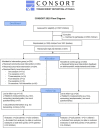Effectiveness of a family-, school- and community-based intervention on physical activity and its correlates in Belgian families with an increased risk for type 2 diabetes mellitus: the Feel4Diabetes-study
- PMID: 32787943
- PMCID: PMC7425007
- DOI: 10.1186/s12889-020-09336-7
Effectiveness of a family-, school- and community-based intervention on physical activity and its correlates in Belgian families with an increased risk for type 2 diabetes mellitus: the Feel4Diabetes-study
Abstract
Background: The study aimed to investigate the effectiveness of the European Feel4Diabetes intervention, promoting a healthy lifestyle, on physical activity and its correlates among families at risk for type 2 diabetes mellitus (based on the Finnish Diabetes Risk Score) in Belgium.
Methods: The Feel4Diabetes intervention involved three components: family, school and community component, with the family component consisting of 6 counseling sessions for families at risk. Main outcomes were objectively measured physical activity levels and its subjectively measured correlates. The final sample consisted of 454 parents (mean age 39.4 years; 72.0% women) and 444 children (mean age 8.0 years; 50.1% girls). Multilevel repeated measures analyses were performed to assess intervention effectiveness after 1 year.
Results: In parents, there was no significant intervention effect. In children, there were only significant negative effects for moderate to vigorous physical activity (p = 0.05; ηp2 = 0.008) and steps (p = 0.03; ηp2 = 0.006%) on weekdays, with physical activity decreasing (more) in the intervention group.
Conclusions: The F4D-intervention lacks effectiveness on high-risk families' physical activity and its correlates in Belgium. This could partially be explained by low attendance rates and a large drop-out. To reach vulnerable populations, future interventions should invest in more appropriate recruitment (e.g. more face-to-face contact) and more bottom-up development of the intervention (i.e. co-creation of the intervention with the target group).
Trial registration: The Feel4Diabetes-study was prospectively registered at clinicaltrials.gov as NCT02393872 on 20 March 2015.
Keywords: Healthy lifestyle promotion; High-risk families; Intervention effectiveness; Parents; Primary schoolchildren; Type 2 diabetes mellitus.
Conflict of interest statement
The authors declare that they have no competing interests.
Figures
Similar articles
-
The effect of a cluster-randomized controlled trial on lifestyle behaviors among families at risk for developing type 2 diabetes across Europe: the Feel4Diabetes-study.Int J Behav Nutr Phys Act. 2021 Jul 1;18(1):86. doi: 10.1186/s12966-021-01153-4. Int J Behav Nutr Phys Act. 2021. PMID: 34210333 Free PMC article. Clinical Trial.
-
A school- and community-based intervention to promote healthy lifestyle and prevent type 2 diabetes in vulnerable families across Europe: design and implementation of the Feel4Diabetes-study.Public Health Nutr. 2018 Dec;21(17):3281-3290. doi: 10.1017/S1368980018002136. Epub 2018 Sep 12. Public Health Nutr. 2018. PMID: 30207513 Free PMC article. Clinical Trial.
-
Two-stage, school and community-based population screening successfully identifies individuals and families at high-risk for type 2 diabetes: the Feel4Diabetes-study.BMC Endocr Disord. 2020 Mar 12;20(Suppl 1):12. doi: 10.1186/s12902-019-0478-9. BMC Endocr Disord. 2020. PMID: 32164646 Free PMC article. Clinical Trial.
-
Obtaining evidence base for the development of Feel4Diabetes intervention to prevent type 2 diabetes - a narrative literature review.BMC Endocr Disord. 2020 Mar 12;20(Suppl 1):140. doi: 10.1186/s12902-019-0468-y. BMC Endocr Disord. 2020. PMID: 32164690 Free PMC article. Review.
-
What works in community-based interventions promoting physical activity and healthy eating? A review of reviews.Int J Environ Res Public Health. 2014 May 30;11(6):5866-88. doi: 10.3390/ijerph110605866. Int J Environ Res Public Health. 2014. PMID: 24886756 Free PMC article. Review.
Cited by
-
Interventions to prevent obesity in children aged 5 to 11 years old.Cochrane Database Syst Rev. 2024 May 20;5(5):CD015328. doi: 10.1002/14651858.CD015328.pub2. Cochrane Database Syst Rev. 2024. PMID: 38763517 Free PMC article. Review.
-
Prevalence of coronary risk factors in load transport drivers.Rev Bras Med Trab. 2022 Jun 30;20(2):254-261. doi: 10.47626/1679-4435-2022-695. eCollection 2022 Apr-Jun. Rev Bras Med Trab. 2022. PMID: 36127909 Free PMC article.
-
Current Activities Centered on Healthy Living and Recommendations for the Future: A Position Statement from the HL-PIVOT Network.Curr Probl Cardiol. 2021 Jun;46(6):100823. doi: 10.1016/j.cpcardiol.2021.100823. Epub 2021 Feb 27. Curr Probl Cardiol. 2021. PMID: 33789171 Free PMC article. Review.
-
Telehealth-delivered, Cardioprotective Diet and Exercise Program for Liver Transplant Recipients: A Randomized Feasibility Study.Transplant Direct. 2021 Feb 4;7(3):e667. doi: 10.1097/TXD.0000000000001118. eCollection 2021 Mar. Transplant Direct. 2021. PMID: 33564717 Free PMC article.
References
-
- International Diabetes Federation [IDF], IDF Diabetes Atlas 8th edition 2017 - regional fact sheet Europe, I.D. Brussels: Federation, Editor; 2017.
-
- Ogurtsova K, et al. IDF diabetes atlas: global estimates for the prevalence of diabetes for 2015 and 2040. Diabetes Res Clin Pract. 2017;128:40–50. - PubMed
-
- International Diabetes Federation, IDF Diabetes atlas eight edition. Brussels: International Diabetes Federation; 2017.
-
- Haines L, et al. Rising incidence of type 2 diabetes in children in the U.K. Diabetes Care. 2007;30(5):1097–1101. - PubMed
-
- Schober E, et al. Diabetes mellitus type 2 in childhood and adolescence in Germany and parts of Austria. Eur J Pediatr. 2005;164(11):705–707. - PubMed
Publication types
MeSH terms
Associated data
Grants and funding
LinkOut - more resources
Full Text Sources
Medical


